Previewing The Fifth Democratic Debate
Taking a look at the state of the race as Democratic prepare to clash in tonight's fifth debate.
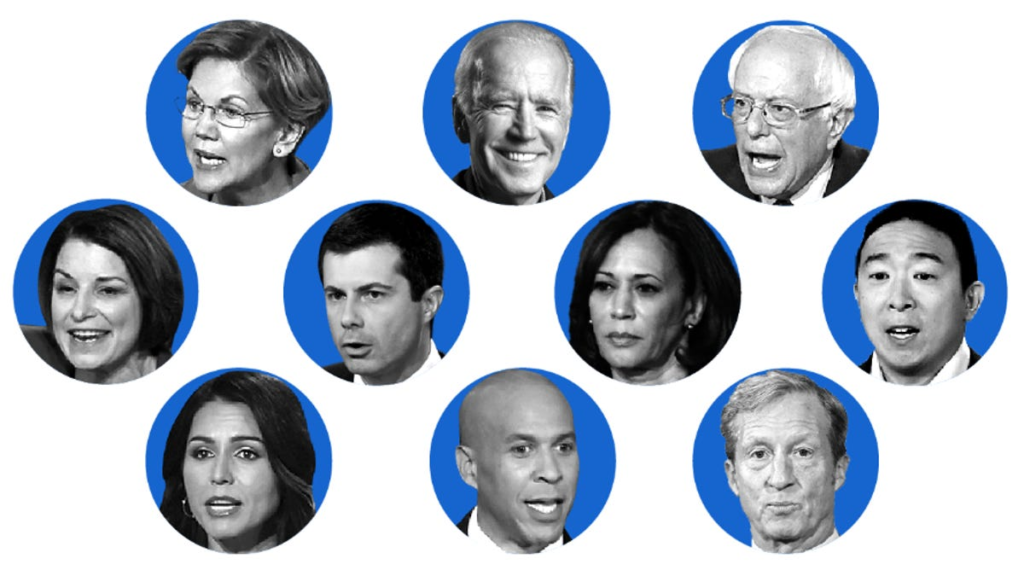
In just under twelve hours, the ten candidates who were able to meet the criteria established by the Democratic National Committee will meet on a stage in Atlanta for the fifth debate of the Democratic campaign cycle. Coming as it does some 76 days before the Iowa Caucuses, this will be among the more significant of the encounters between the candidates, and could mean the end of the road for candidates such as Cory Booker, Kamala Harris, and others unless they are able to revive campaigns that are quite clearly floundering while the frontrunners continue to advance forward, Additionally, thanks to some significant changes in the polls over the past month we’re likely to see increased focus on candidates who have previously sailed under the radar even as their poll numbers rose, specifically including South Bend, Indiana Mayor Pete Buttigieg.
The first debate, of course, resulted in significant changes in the nature of the race from what it looked like prior to the debate. As we saw in a series of polls in the immediate aftermath of the debate — see here, here, here, here, here and here — that immediate impact consisted of significant gains for both Senator Harris and Senator Warren, largely at the expense of Senator Bernie Sanders and former Vice-President Biden. As time went on, though, there were signs that the post-debate bump was relatively short-lived, especially for Senator Harris.
The second debate, meanwhile, had relatively little impact on the polls, except to the extent that what had been a four-person race seemed to be slowly transforming into a three-person contest as Senator Harris continued to decline in nationwide polling. (See here and here.)
The most notable thing that happened after the third debate was the fact that Massachusettes Senator Elizabeth Warren has continued to surge in the polling at the state and national level to the point where she and the former Vice-President were close to forming a tier all their own while Sanders, Harris, and Buttigieg made up a second tier.
The fourth debate in October consisted of much of the same clash between the party’s progressive’s and moderates that we’ve seen before, but didn’t really result in any significant changes in the polls as Biden and Warren continued as the top two candidates, followed by Sanders and Buttigieg, with Harris fading but still hanging on in most national and state polling.
As we await tonight’s debate, here’s what the recent national polls look like:
- In the latest poll from The Hill and HarrisX, Vice-President Biden leads with 30% of the vote, followed by Senator Sanders at 18%, Senator Warren at 15%, Mayor Pete Buttigieg at 7%, Kamala Harris at 4%, newcomer Mike Bloomberg at 3%, Andrew Yang and Julian Castro at 2%, and all other candidates at or below 1%;
- The latest Politico/Morning Consult poll has Biden at 32%, Sanders at 20%, Warren at 17%, Buttigieg at 8%, Harris at 5%, Bloomberg and Yang at 3%, Amy Klobuchar, Cory Booker, and Tulsi Gabbard at 2%, and all other candidates at or under 1%;
- Finally, the latest Economist/YouGov poll puts Warren at 26%, Biden at 23%, Sanders at 17%, Buttigieg at 9%, Harris and Yang at 4%, Klobuchar, Castro, and Booker at 2%, and all other candidates at or under 1%.
The national RealClearPolitics average shows the following:
- Joe Biden — 28.3%
- Elizabeth Warren — 19.3%
- Bernie Sanders — 18.3%
- Pete Buttigieg — 8.0%
- Kamala Harris — 4.7%
- Mike Bloomberg and Andrew Yang —- 3.0%
- Amy Klobuchar, Tulsi Gabbard, and Julian Castro — 1.7%
- Cory Booker and John Delaney — 1.3%
- All other candidates at or under 1%
The most notable thing about the RCP chart, meanwhile, is the fact that it shows Biden remaining as steady as he’s generally been since getting into the race while yet another potential challenger, Elizabeth Warren slips:
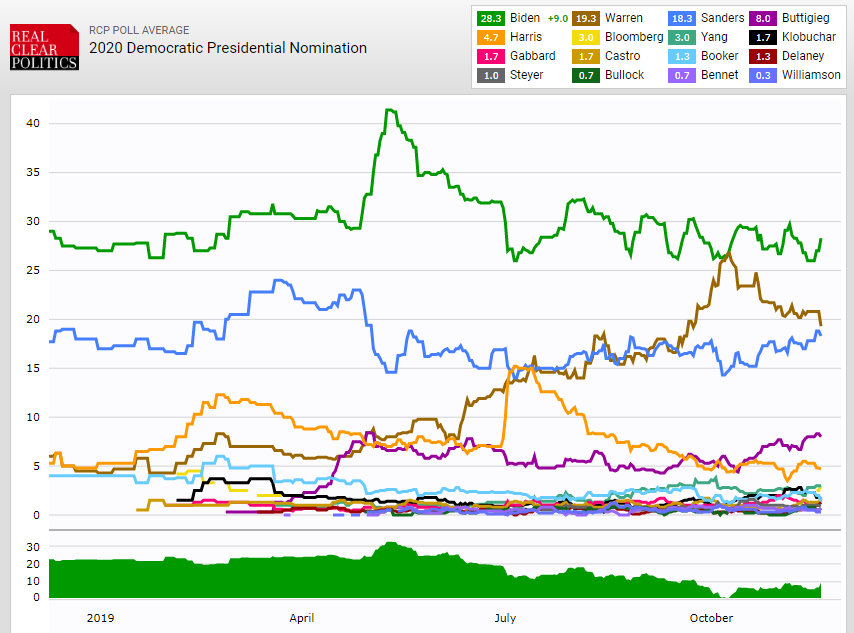
Looking at the state averages, we see the following:
- In Iowa, we’ve seen the biggest change with Pete Buttigieg taking the lead at 21.0%, followed by Elizabeth Warren at 18.8%, Joe Biden at 17.6%, Bernie Sanders at 17.2%, Amy Klobuchar at 5.0%, Kamala Harris at 3.6%, Tom Stever and Andrew Yang at 2.6%, Tulsi Gabbard at 2.0%, Cory Booker at 1.8%, and all other candidates at or under 1%;
- In New Hampshire, Warren leads the polling average at 20.7%, Biden is in second place at 19.0%, Buttigieg at 18.7%, Sanders, who overwhelmingly won the Granite State primary in 2016, at 14.3%, Klobuchar at 4.0%, Steyer and Gabbard at 3.9%, Yang at 2.3%, Booker and Harris at 1.7%, and all other candidates under 1%;
- Nevada has not seen much polling, but the average there currently puts Biden at the top at 29.0%, Warren at 20.0%. Sanders at 19.8%, Buttigieg at 7.3%, Harris at 4.0%, Steyer at 3.5%, Yang at 3.0%, Klobuchar at 2.0%, Booker at 1.3%, and all other candidates averaging at or below 1%;
- In South Carolina, former Vice-President Biden continues to maintain a strong lead at 35.8%, Warren in second place at 16.3%, Sanders at 11.3%, Buttigieg at 6.3%, Harris at 6.3%, Steyer at 4.0%, Yang at 2.5%, Booker at 2.3%, Klobuchar at 1.8%, Gabbard at 1.5%, and all other candidates under 1%.
The biggest story in the polls over the past month, of course, has been the rise of Pete Buttigieg, who has taken the lead in Iowa and, in a poll released this morning, is shown to be surging in New Hampshire as well. As a result, we can likely expect that the South Bend Mayor, who have generally floated somewhat under the radar That likely won’t be the case tonight, and Buttigieg would be well-advised to answer questions both on the specifics of his policy ideas and on the overall question of whether or not his somewhat limited experience is sufficient to prepare him to be President of the United States. How he handles this new attention will go a long way toward determining his future.
In addition to Buttigieg, it’s also likely we’ll see continued attention on the split between the Democratic Party’s progressive wing, represented by Elizabeth Warren and Bernie Sanders, and the more moderate center-left wing of the party represented by Joe Biden, Pete Buttigieg, and Amy Klobuchar. Additionally, as I stated above, this debate will likely be the last chance for some candidates, most notably Cory Booker and Kamala Harris, to attempt to turn their campaigns around. Both candidates have been floundering in the polls and seem to be just weeks away from collapsing entirely. Unless they are able to change course, this could be the end of the road for them.
Debate coverage begins at 8 pm tonight on the networks of NBC — including NBC’s broadcast network, MSNBC, and Telemundo — as well as streaming at the websites for NBC News, MSNBC, and The Washington Post, which is co-sponsoring the debate with NBC. We’ll have a wrap-up post up tomorrow morning.

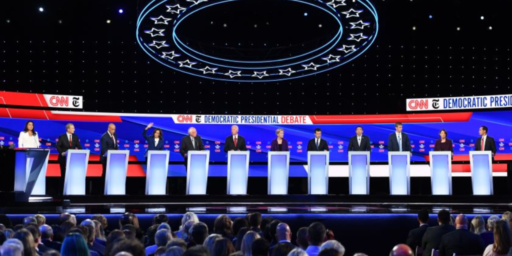
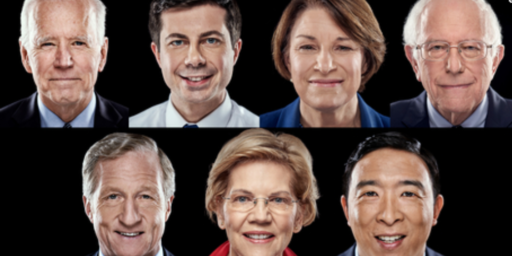
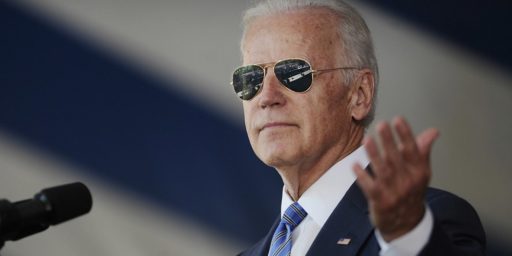
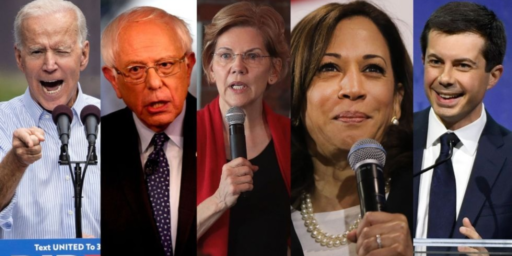
Mr. Mataconis –
A minor nitpick/question: Why do you use the averages for NH, NV, and SC, yet don’t use averages for Iowa? According to RCP, the polling averages for Iowa are…
Buttigieg – 22.7
Biden – 18.7
Warren – 17.3
Sanders – 16.7
Or did I misread your post?
https://www.realclearpolitics.com/epolls/2020/president/ia/iowa_democratic_presidential_caucus-6731.html
Tulsi somehow made it, but she couldn’t be bothered to take the gum/mint out of her mouth.
Anybody else watching?